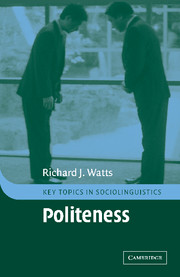Book contents
- Frontmatter
- Contents
- Preface
- 1 Introducing linguistic politeness
- 2 Politeness through time and across cultures
- 3 Modelling linguistic politeness (I)
- 4 Modelling linguistic politeness (II): Brown and Levinson and their critics
- 5 Facework and linguistic politeness
- 6 A social model of politeness
- 7 Structures of linguistic politeness
- 8 Relevance Theory and concepts of power
- 9 Politic behaviour and politeness in discourse
- 10 Politic behaviour and politeness within a theory of social practice
- Notes
- Glossary of terms
- References
- Index
3 - Modelling linguistic politeness (I)
Published online by Cambridge University Press: 24 November 2009
- Frontmatter
- Contents
- Preface
- 1 Introducing linguistic politeness
- 2 Politeness through time and across cultures
- 3 Modelling linguistic politeness (I)
- 4 Modelling linguistic politeness (II): Brown and Levinson and their critics
- 5 Facework and linguistic politeness
- 6 A social model of politeness
- 7 Structures of linguistic politeness
- 8 Relevance Theory and concepts of power
- 9 Politic behaviour and politeness in discourse
- 10 Politic behaviour and politeness within a theory of social practice
- Notes
- Glossary of terms
- References
- Index
Summary
THEORISING ABOUT POLITENESS
In the first two chapters I argued that the object of study for a theory of (im)politeness should be lay perceptions of (im)politeness, or first-order (im)politeness. The problem is that individual evaluations of what constitutes polite and impolite behaviour and the ways in which instantiations of (im)politeness are assessed are so varied that researchers have preferred to abstract away from the kinds of cultural, historical and social relativity inherent in first-order conceptualisations. Second-order politeness, or politeness, then becomes an abstract term referring to a wide variety of social strategies for constructing and reproducing cooperative social interaction across cultures. The fact that the English lexeme politeness is used to denote this second-order concept is either merely an accident of science or, more probably, a consequence of the rapid spread of English as the lingua franca in the international research community.
As a technical term, then, the word ‘politeness’ does not always mean what native speakers of English in the here-and-now take it to mean. Instead, it has to be assigned a timeless, placeless existence as a non-value-laden term in a model of polite behaviour. However, if, in using the term ‘politeness’, we attempt to rid ourselves of all the first-order connotations the word might have, (im)politeness and the wide variety of evaluations of the terms ‘politeness’ and ‘impoliteness’ can no longer be the object of study for a theory of linguistic politeness.
- Type
- Chapter
- Information
- Politeness , pp. 47 - 84Publisher: Cambridge University PressPrint publication year: 2003



